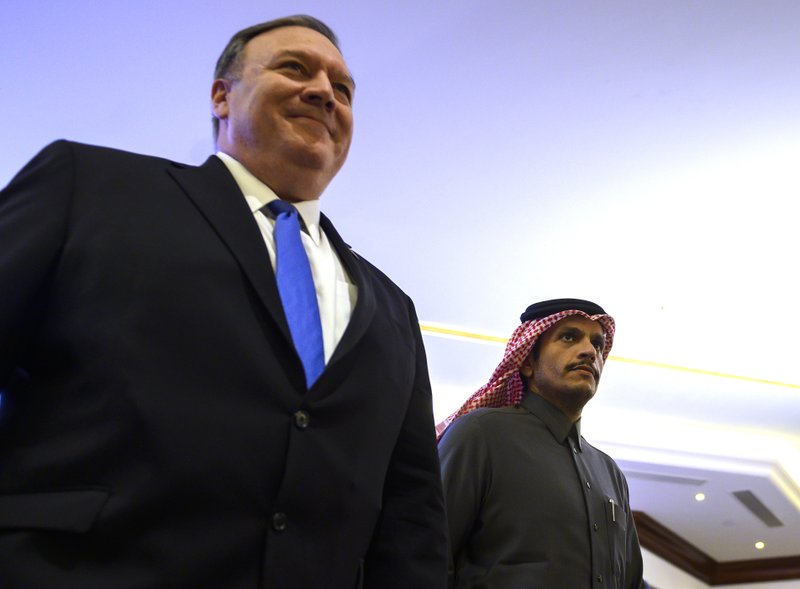
US Secretary of State Mike Pompeo. (Photo:AP)
US Secretary of State Mike Pompeo said Sunday an ongoing boycott of Qatar by four of America’s allies in the Middle East “has dragged on too long,” though he gave no sign of any coming breakthrough in the dispute.
Stopping off in the small, energy-rich nation as part of a Mideast tour, America’s top diplomat made a repeated point to say that “great things” were happening between Qatar and the United States.
“We’re all more powerful when we’re working together,” Pompeo said at a news conference. “Disputes between countries that have a shared objective are never helpful.”
Pompeo said he signed a memorandum of understanding with Qatar regarding the expansion and renovation of al-Udeid Air Base, which hosts the forward headquarters of the US military’s Central Command and some 10,000 American troops.
However, comments by Pompeo and Qatari Foreign Minister Sheikh Mohammed bin Abdulrahman Al Thani gave no sense of any movement in the ongoing diplomatic crisis with Doha.
Later, speaking to a US Embassy staff member in Qatar who said her job was moving to the UAE due to the boycott’s effects, Pompeo was even more frank.
“It’s on everyone’s mind and not at all clear that the rift is any closer to being resolved today than it was yesterday — and I regret that,” Pompeo said.
Bahrain, Egypt, Saudi Arabia and the United Arab Emirates began a boycott of Qatar in June 2017, alleging Qatar funds extremist groups and has too-cozy ties to Iran. Qatar has long denied funding extremists, but Doha shares a massive offshore natural gas field with Tehran that gives its citizens the highest per-capita income in the world. It restored diplomatic relations with Iran after the crisis erupted, marking a setback for Saudi Arabia, which views the Shiite power Iran as its main regional rival.
A similar dispute involving Qatar erupted in 2014. But this time positions have hardened against Qatar, whose support for Islamist opposition groups has angered the Arab nations now boycotting it.
Earlier this month, Gen. Anthony Zinni, a former commander of U.S. Central Command who retired from the Marine Corps in 2000, resigned as special American envoy to resolve the dispute. Regional analysts suggested it may be in part to intransigence of those involved in the crisis.
“The departure of Mr. Zinni in no way reflects any change in America’s Middle East efforts, our strategy or our ongoing commitment to the region,” Pompeo said. “It was a time for change. He made this decision to move on, but America’s commitment remains unchanged.”
From Qatar, Pompeo travels to Saudi Arabia on his Mideast tour. The relationship between Riyadh and Washington remains tense following the October assassination of Washington Post columnist Jamal Khashoggi at the Saudi Consulate in Istanbul. Members of Crown Prince Mohammed bin Salman’s entourage have been implicated in the killing and U.S. lawmakers have demanded America pull back its support of the Saudi-led war in Yemen.
“We will continue to have a conversation with the crown prince and the Saudis about ensuring that the accountability is full and complete with respect to the unacceptable murder of Jamal Khashoggi,” Pompeo said.
“We’ll continue to talk about that and make sure we have all the facts so that they are held accountable certainly by the Saudis, but by the United States as well, where appropriate,” he added.


